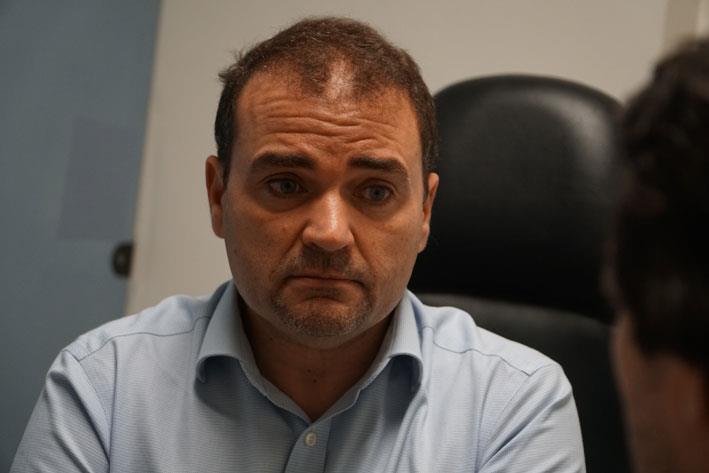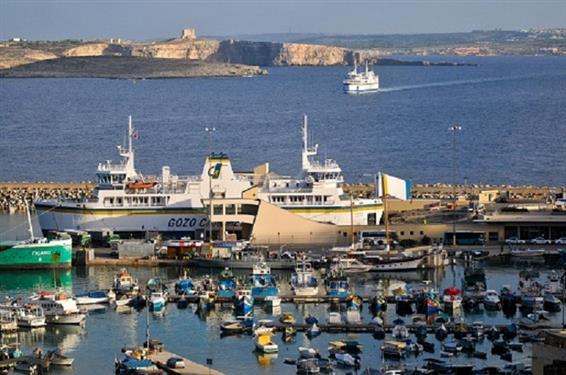The proposed fast ferry between Malta and Gozo may not have a big effect on the connectivity problem that Gozitans currently face, said former Parliamentary Secretary for Active Aging and Disability Franco Mercieca, in an interview with The Malta Independent on Sunday.
Mercieca said that, while the world is moving forward, Gozo is stuck where it is due to its problem of accessibility. The island is currently facing numerous problems, be it a brain-drain, a skills-drain, an aging population or simply because it is a region that is under-producing and needs a great deal of government investment to be sustained, he explained. One of Mercieca’s main solutions to address these problems is to improve the connectivity between Gozo and its big sister, Malta.
One of the recent proposals in this respect has been the establishment of a fast ferry between Gozo and Valletta’s Grand Harbour. Whilst basically in agreement with any mode of transport that strengthens the connection between the two islands, Mercieca also voiced his doubts about how effective a fast ferry service would be.
His doubts are based on one main premise: that a fast ferry will only cater to a specific group. The ferry will be passenger only, and for such a project to work, Mercieca explained, it is important that the passengers have a good connection between where they disembark and their final destination. The aim of this type of transport should be to alleviate travelling problems, he said, pointing out that it makes no sense to replace a journey which took, say, 30 minutes by one that takes the same length of time – or perhaps even longer.

On the other hand, Mercieca is one of the primary advocates for the building of a permanent link between Malta and Gozo and, indeed, he is the chairman of the committee that is overseeing the Gozo tunnel project, a project which is now moving towards implementation. One of the main concerns regarding this project is that opening such a permanent link to Gozo would see the island lose its unique charm as a result of the same flagrant over-development that Malta is currently experiencing.
Whilst admitting that these concerns are justified, Mercieca said that Gozo’s characteristics were going to change even without the tunnel. This is because the population of the island itself is shrinking – as is evidenced by the falling number of schoolchildren on the island, which stands at 40 per cent, and a reduction in the birth rate. The statistics that show a population of around 30,000 on Gozo are tangibly incorrect, Mercieca explained, because there are many Maltese with Gozitan ID cards who just use them to take advantage of lower ferry fares, and a lot of Gozitans who actually reside in Malta. Indeed, he estimates that the actual population of the island stands at 15,000 – 50 per cent of what the statistics say. In addition, there is an ever-increasing number of foreigners who, he said, would be moving to Gozo because they wanted to settle somewhere, and their presence would change Gozitan society.

This being said, Mercieca admitted that Gozo’s environment needs to be protected at all costs, and that the granting of building permits needed to be controlled. It cannot be allowed that, just because a tunnel makes the island more accessible, we will then see permits being given out “here and there”. He also referred to the fact that the Gozo tunnel will not be free to access: there will be a toll involved. Indeed, he said, the toll will probably be more expensive than the ferry currently in place because the tunnel gives a more flexible mode of access to the island, and a faster one, that does not involve any queuing.
The tunnel, however, is a long-term fix for this connectivity problem, so what short term measures can be introduced in the meantime? One idea that Mercieca has been promoting for years now is that of a pre-booking system for the Gozo ferry service. The idea is a simple one: allowing commuters to book their place on the ferry online before they travel.
The benefits to such a system are numerous. Firstly, it will eventually eliminate the first-come-first-served scenario that exists today. This, in turn, means that it will eliminate the huge queues there always seem to be at peak times, because a commuter – if booked on a specific ferry – knows that he or she has a place on it regardless of anything. If the ferry is fully booked, the customer knows that the booking will have to be for the following ferry, and that way he or she can enjoy that little bit of extra time in Gozo. Reducing the queues and the amount of time people spend waiting in their cars, listening to their radios, is paramount, said Mercieca.

Apart from this, however, such a system would also help the Gozo Channel Company, because it would give the ferry operators more information about their passengers. Currently, the operator does not know how many people will be on a particular ferry and what means of transport they will be using. With such an online system, however, the company can tally the data to ascertain peak travelling hours and the requirements of their passengers, and then adapt their schedule accordingly.
This is one of the main things that the Gozo Ministry needs to think about implementing, Mercieca said. He also laments the fact that, in the current scenario of a monopoly service, there is little interest in the company implementing anything that could be innovative, preferring to adopt a ‘take it or leave it’ approach.
So simple is a pre-booking system that Mercieca believes it would take only two to three months to actually implement. It could be done initially on a partial basis, he said, with say 70 per cent of the vehicle spaces on the ship reserved for pre-bookings and the remainder available for those in the queue. After this, he said, it is only natural that more and more people would use the booking service as opposed to the first-come, first-served service, and that would mean that the whole ferry could then be open for pre-booking. The benefits, as explained above, he said, would far exceed the effort required to implement it. Indeed, it is a “win-win situation”, Mercieca concluded.